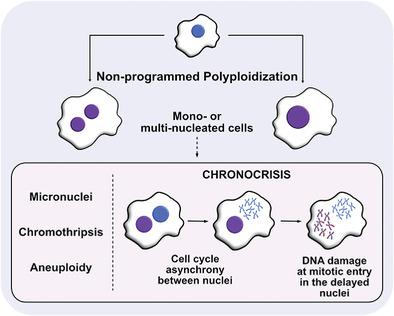Our official English website, www.x-mol.net, welcomes your
feedback! (Note: you will need to create a separate account there.)
CHRONOCRISIS: When Cell Cycle Asynchrony Generates DNA Damage in Polyploid Cells.
BioEssays ( IF 3.2 ) Pub Date : 2020-09-03 , DOI: 10.1002/bies.202000105 Simon Gemble 1 , Renata Basto 1
BioEssays ( IF 3.2 ) Pub Date : 2020-09-03 , DOI: 10.1002/bies.202000105 Simon Gemble 1 , Renata Basto 1
Affiliation

|
Polyploid cells contain multiple copies of all chromosomes. Polyploidization can be developmentally programmed to sustain tissue barrier function or to increase metabolic potential and cell size. Programmed polyploidy is normally associated with terminal differentiation and poor proliferation capacity. Conversely, non‐programmed polyploidy can give rise to cells that retain the ability to proliferate. This can fuel rapid genome rearrangements and lead to diseases like cancer. Here, the mechanisms that generate polyploidy are reviewed and the possible challenges upon polyploid cell division are discussed. The discussion is framed around a recent study showing that asynchronous cell cycle progression (an event that is named “chronocrisis”) of different nuclei from a polyploid cell can generate DNA damage at mitotic entry. The potential mechanisms explaining how mitosis in non‐programmed polyploid cells can generate abnormal karyotypes and genetic instability are highlighted.
中文翻译:

CHRONOCRISIS:当细胞周期不同步在多倍体细胞中产生 DNA 损伤时。
多倍体细胞包含所有染色体的多个拷贝。多倍化可以在发育过程中进行编程,以维持组织屏障功能或增加代谢潜力和细胞大小。程序化多倍体通常与终末分化和增殖能力差有关。相反,非程序化的多倍体可以产生保留增殖能力的细胞。这可以促进基因组的快速重排并导致癌症等疾病。在这里,回顾了产生多倍体的机制,并讨论了多倍体细胞分裂可能面临的挑战。讨论围绕最近的一项研究展开,该研究表明来自多倍体细胞的不同细胞核的异步细胞周期进程(称为“慢性危机”的事件)可在有丝分裂进入时产生 DNA 损伤。
更新日期:2020-09-24
中文翻译:

CHRONOCRISIS:当细胞周期不同步在多倍体细胞中产生 DNA 损伤时。
多倍体细胞包含所有染色体的多个拷贝。多倍化可以在发育过程中进行编程,以维持组织屏障功能或增加代谢潜力和细胞大小。程序化多倍体通常与终末分化和增殖能力差有关。相反,非程序化的多倍体可以产生保留增殖能力的细胞。这可以促进基因组的快速重排并导致癌症等疾病。在这里,回顾了产生多倍体的机制,并讨论了多倍体细胞分裂可能面临的挑战。讨论围绕最近的一项研究展开,该研究表明来自多倍体细胞的不同细胞核的异步细胞周期进程(称为“慢性危机”的事件)可在有丝分裂进入时产生 DNA 损伤。











































 京公网安备 11010802027423号
京公网安备 11010802027423号